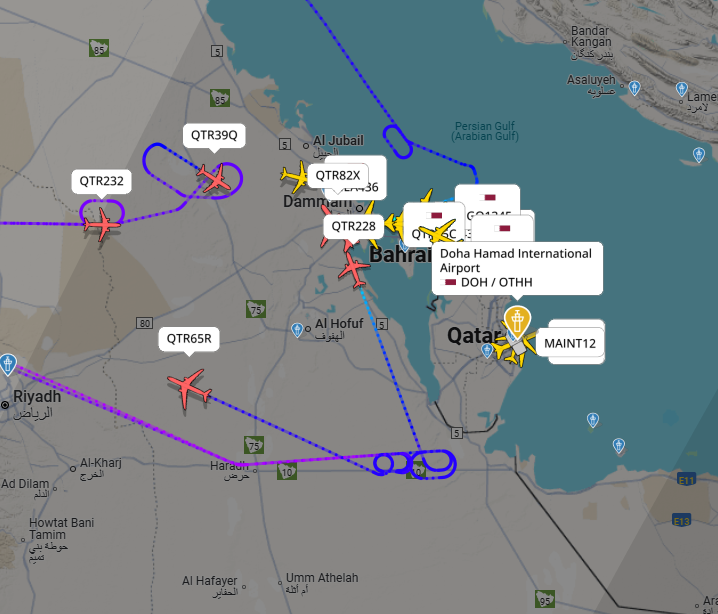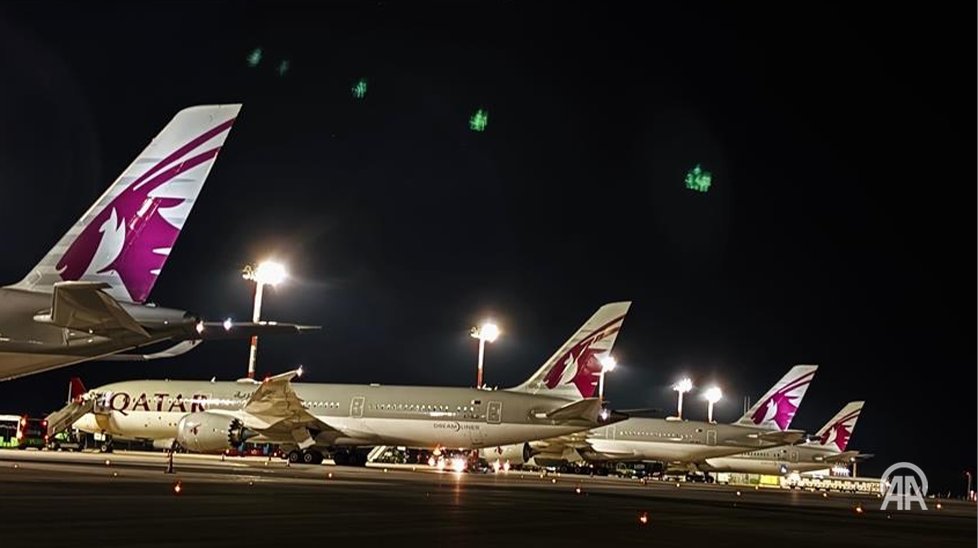As tensions in the Middle East escalate, particularly following recent U.S. airstrikes on Iran, Qatar has implemented precautionary measures by temporarily closing its airspace. This decision, announced on Monday, aims to ensure the safety of residents and visitors and has led to significant disruptions at Doha Hamad International Airport, one of the world’s busiest international hubs.

The airspace closure forced the majority of Qatar Airways flights bound for Doha to divert to alternate airports, severely impacting operations across Europe, Asia, the U.S., Australia, and the Gulf region. Shortly after the announcement from Qatar’s Ministry of Foreign Affairs, flights began diverting mid-route, while departures from Hamad International Airport were suspended.
Key Diversion Statistics
Istanbul Airport and King Abdulaziz International Airport in Jeddah each handled nine rerouted Qatar Airways flights, making them the most affected locations. Other airports, including Muscat International Airport and Prince Mohammad bin Abdulaziz Airport, also managed multiple diversions. Notable diversion statistics include:
| |
Airport
|
City/Country
|
Number Of Diversions
|
|
1
|
Istanbul Airport (IST)
|
Istanbul, Turkey
|
9
|
|
2
|
King Abdulaziz Int’l (JED)
|
Jeddah, Saudi Arabia
|
9
|
|
3
|
Muscat International Airport (MCT)
|
Muscat, Oman
|
8
|
|
4
|
Prince Mohammad bin Abdulaziz (MED)
|
Medina, Saudi Arabia
|
7
|
|
5
|
King Fahd International (DMM)
|
Dammam, Saudi Arabia
|
6
|
|
6
|
Kempegowda International (BLR)
|
Bengaluru, India
|
5
|
|
7
|
Izmir Adnan Menderes Airport (ADB)
|
Izmir, Turkey
|
4
|
|
8
|
Salalah International Airport (SLL)
|
Salalah, Oman
|
4
|
|
9
|
Riyadh King Khalid International Airport (RUH)
|
Riyadh, Saudi Arabia
|
3
|
|
10
|
Abu Dhabi International Airport (AUH)
|
Abu Dhabi, UAE
|
3
|
European Flights Diverted
Most European flights impacted by the airspace closure were redirected to Istanbul, with additional diversions to other Turkish airports. For instance, flights from Amsterdam and Algiers were rerouted to Antalya and Bodrum, respectively. Long-haul flights from Asia and Australia also experienced significant rerouting, with Bengaluru receiving the highest number of diverted flights.
.jpg)
Several flights returned to their departure points mid-air. Notably, Flight QR146 from Barcelona turned back after entering Turkish airspace, and similar cases occurred with flights from Madrid and the UK, which returned before reaching the Gulf region. Other flights experienced delays and prolonged holding patterns, complicating the situation further.
Impact on Global Operations
The disruptions extended beyond Qatar Airways, affecting many international airlines. Major carriers, including Emirates, British Airways, and Singapore Airlines, adjusted their flight schedules and routes in response to the sudden closure. This led to a ripple effect on global air traffic, as many planes had to find alternative landing locations while keeping safety as the top priority.

Travelers faced uncertainty and frustration, with some flights landing in unexpected destinations hours from their original plans. Passengers reported long waits and confusion at diverted airports, as airlines scrambled to provide accommodations and information.
Passenger Assistance and Accommodations
In light of the disruptions, Qatar Airways and other affected airlines deployed customer service teams to assist stranded passengers. Many airlines offered hotel accommodations and meal vouchers for those left in limbo due to diverted flights. Qatar Airways also set up information desks at key airports to help travelers navigate the changes.
.jpg)
For those whose flights were canceled, airlines provided options for rebooking or refunds, although availability was limited due to the high volume of affected passengers.
Reopening of Qatari Airspace
By Tuesday morning, Qatari authorities announced the reopening of the country’s airspace, and operations at Hamad International Airport began to gradually normalize. However, the effects of the disruption continued into the following day, with numerous cancellations affecting scheduled arrivals in Doha. Airlines such as British Airways, Singapore Airlines, Iberia, American Airlines, and JetBlue reported canceled inbound services.
Ongoing Regional Tensions
The situation in the Middle East remains volatile, with experts warning of potential further escalations. Analysts are closely monitoring developments, as diplomatic efforts are underway to de-escalate tensions between the U.S. and Iran. The ongoing situation raises concerns about the stability of air travel in the region, prompting airlines to stay vigilant and adaptable.
.jpg)
Economic Impact
The disruptions also have broader economic implications. Qatar Airways, which is a significant player in international air travel, may face financial repercussions due to the disruptions and cancellations. The airline industry is already recovering from the impacts of the COVID-19 pandemic, and further interruptions could hinder this recovery.
As regional tensions continue to impact air travel, the aviation industry is facing unprecedented challenges. With the reopening of Qatari airspace, airlines are working to restore normal operations, but the situation remains fluid. Travelers are advised to stay informed about their flight statuses and to expect continued adjustments as airlines navigate these turbulent times. The unfolding events serve as a reminder of the fragility of global air travel amid geopolitical uncertainties.














.jpg)




.jpg)












.jpg)

.jpg)
.jpg)














.jpg)









